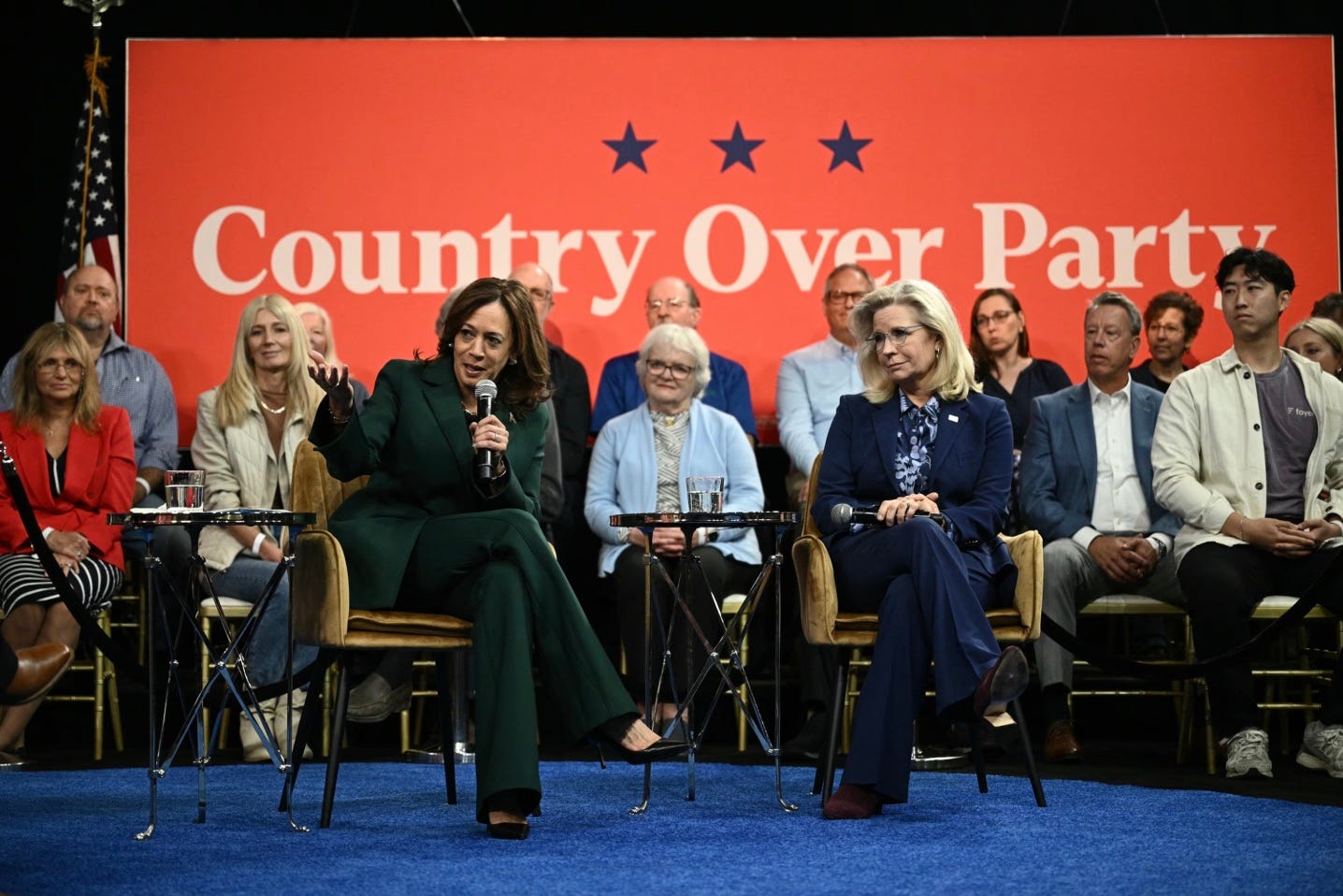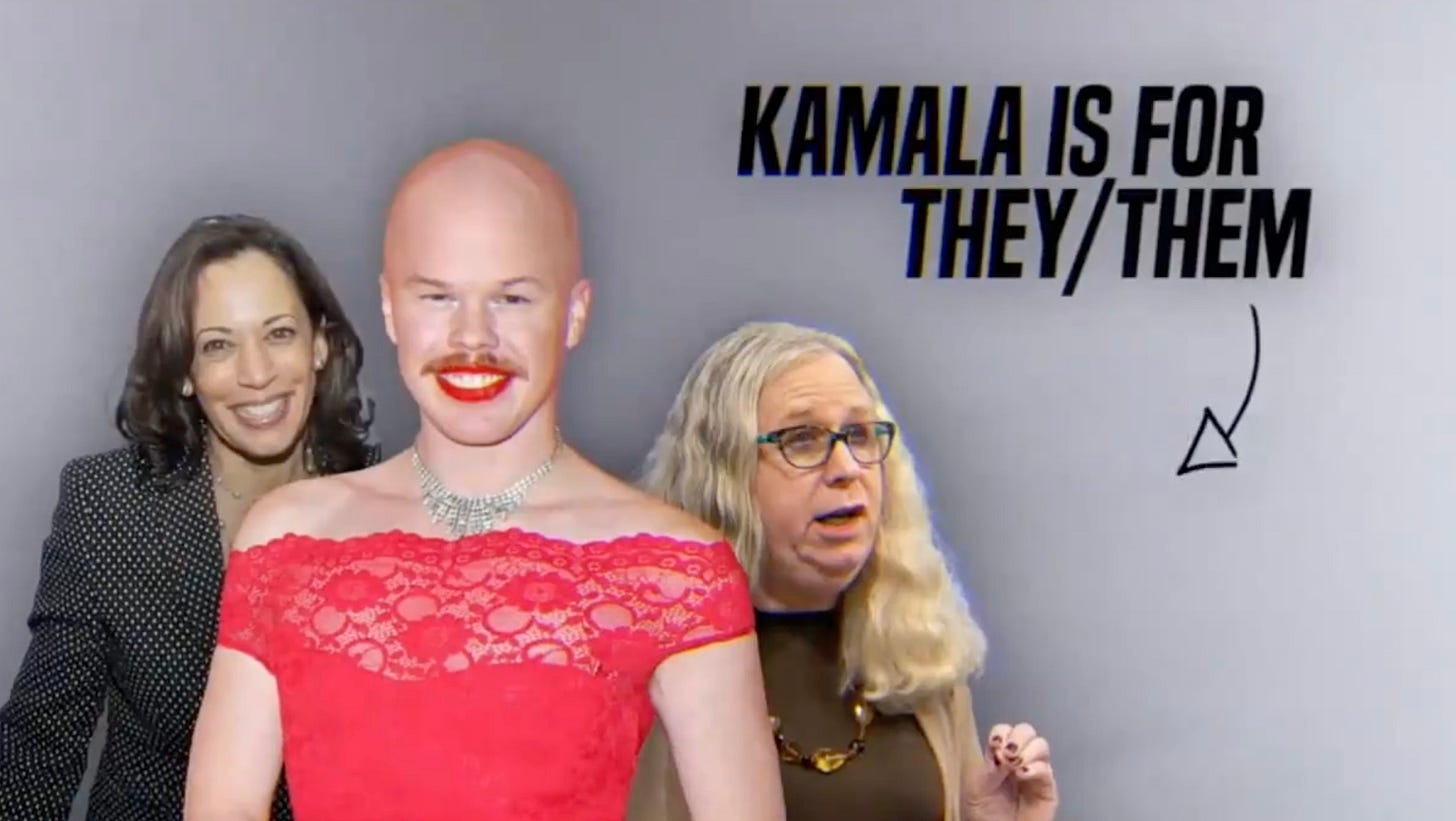Why Trump Won, and the Establishment Lost
Reframing the narrative on democracy, unity, personality, and policy
Former Vox video guy and generally X-obsessed lefty Aaron Rupar was drunk-posting on the Tuesday night before Thanksgiving. “A failed president who incited a coup attempt and then was found liable of sexual assault and then was convicted of felonies won the popular vote and electoral college. I still haven’t seen a satisfactory explanation. Probably never will,” he wrote, admitting the next morning he had a “few drinks” before pushing send on that one.
I’d like to attempt to provide Aaron and his fellow shocked Acela Media members a “satisfactory explanation” — it’s just a guess, of course, and the truth is it’s likely due to dozens if not hundreds of factors. But I’ve been thinking a lot about the results too — not because I was particularly surprised, but because they felt so consequential. Is it recency bias? My own Main Character Syndrome? Or was what happened earlier this month truly a seismic event, that will have major ramifications in politics, culture, the media, and more for decades to come? Here’s my take on why Trump won, and did so definitively — democracy, unity, personality, and policy.
1. Democracy
You could make the argument Donald Trump won the 2024 election way back in July, and if you wanted to pinpoint a specific date, I’d put it at July 10. That was the day, as I posted on X, that the “Biden debate debacle saga actually broke the very foundation of how the media and political establishment operate. It broke the fourth wall. A glitch in the matrix.” It was close to two weeks after Biden’s disastrous debate, and the day of the George Clooney op-ed, which was followed by a bizarre Biden statement in response that Jake Tapper refused to let stand on CNN, and had a Dem pundit stammering. It was when Nancy Pelosi, amidst her orchestration of the coup, stopped to question the entire political media apparatus. It was most notably when Ezra Klein admitted on The Bulwark podcast that the whole “Trump’s an existential threat to democracy” narrative was something top Dems were just saying without actually believing.
The whole establishment house of cards finally came tumbling down.
But July had other crucial days too. The Trump assassination attempt in Butler — literally getting hit in the face with a bullet by a would-be assassin on live television — was an actual attack on democracy, and yet it was practically buried by the corporate media. It should have been the biggest story of the decade. It was an after thought — because it was bad for the narrative. That’s even without the added element of Trump’s incredible reaction to it, pumping his fist and yelling “fight” to his supporters. (It was also the day Elon Musk endorsed Trump, as a result of what he saw.)
But the weekend after the assassination attempt was the day someone dropped Biden out of the race via his X handle, and then subsequently endorsed Kamala Harris as his replacement 40 minutes later. And then within what felt like hours and was a day or two maximum, Kamala was just…the new Democratic nominee. No primary, no second thoughts (at least not publicly at the time), and most notably, no actual voter involvement. A few thousand nameless delegates got on board, and suddenly there was a new Democratic nominee that no one had voted for — ever, of course, since she dropped out of the 2020 primary before Iowa.
In 2020, the most memorable Kamala quote was “we did it, Joe.” In 2024, they did it again — not us, as participants, but “they” …the establishment. This is an enormous problem (more on this later), and it’s a blatantly obvious example of subverting democracy, the very hyperbolized threat the left had been pushing regarding Trump.
But the swap and assassination attempt weren’t the only “democracy” elements that helped Trump — the lawfare played a key role too. And one of the great iconic photos from 2024 (of which there is a lot of competition, and all are favorable to Trump — Butler, McDonald’s, etc) was the mugshot. It was all so ridiculous, and had the exact opposite effect from what was intended. Those who hated Trump hated him more, those who loved him loved him more. But those who were in the middle — had mixed feelings, or few feelings at all — were almost all turned off. And there are a lot more of these voters than the corporate press acknowledges — most people I encounter in Texas don’t love or hate Trump. There’s a spectrum of opinion. And those people turned out to vote for him more than they did in 2016 and 2020.
They were turned off by the seedy and stupid New York trial that we actually got. They were turned off by the sheer number of legal battles he was facing. It was a total fail by the establishment that tried to criminalize him into being unacceptable to the public. It backfired spectacularly.
2. Unity
One of the enduring Kamala campaign messages was “Country Over Party,” as she traveled through swing state after swing state with former GOP Representative Liz Cheney, the daughter of George W. Bush VP Dick Cheney, who also had endorsed her. This remains truly one of the most unfathomable strategies ever deployed in a presidential campaign.
If Liz Cheney wants you to win, I guess you can say “thanks.” But why would you make it a centerpiece of your campaign? Democrats don’t like Liz Cheney. Republicans don’t like Liz Cheney. It's utterly confounding that this supposed display of unity was someone’s idea within the billion-dollar Harris campaign operation.
But “unity” as a core element of what makes for a successful 2024 campaign isn’t misguided. Imagine if Kamala had worked to exhibit unity within her own party, and had a Palestinian speaker at the DNC. She might have won Michigan, and Wisconsin. What if she campaigned with AOC, instead of the antithesis of AOC in Liz Freaking Cheney?
It was an across-the-board failure that likely saw her lose votes rather than gain any. But it was even worse because on the other side of the aisle there was actual, authentic, unity. I know I talked up July as the key month for Trump, but if it wasn’t July, August might have been it. That was when Tulsi Gabbard endorsed him — a former Democrat who actually still has support from some on the left, and a constituency on the right too. And it was also when actual Democrat Robert F. Kennedy, Jr. dropped out of the race and endorsed Trump, in an iconic campaign moment (produced by the stars at Charlie Kirk’s Turning Point).
The stagecraft was impeccable, and the speech from RFK was a massive moment in the race — and it’s worth looking at the three key components he hit on as this unity ticket took shape on the Friday after the DNC. RFK said he and Trump would work to end the censorship of Americans and in favor of free speech, he and Trump would put an end to the forever wars and particularly the one in Ukraine, and he and Trump would “Make America Healthy Again” by taking on Big Ag and Big Pharma and the corporations and corporate interests keeping our kids sick.
These sound like Democratic positions from not very long ago, and would actually put RFK in line with the most progressive wing of the Democratic party. And yet Trump embraced them. That’s unity. Watch this ad produced by RFK’s former running mate Nicole Shanahan, who would go on to endorse Trump too despite being a life-long Democrat. The parties have undergone a complete realignment, and Trump embraced the anti-establishment of both parties, while Kamala embraced the establishment of both parties. That’s unity, I suppose, on both sides. But only one resonates with the public.
It’s worth also mentioning JD Vance here, as the absolutely inspired pick by Trump to be his VP. He was a superstar in sparring with the media, was brilliant on the debate stage, and was able to move votes (according to the New York Times focus group of young undecided voters). He had the Secret Ingredient, as I wrote when I suggested he was the right choice.
And in 2016, it’s fair to say he hated Trump. His path to supporting the President-Elect was authentic, but that’s another example of unity too.
3. Personality
A lot has been written about how this was the “Podcast Election,” and I think that framing is accurate. Trump’s Joe Rogan interview was a real needle-mover, and it, plus Vance’s appearance and Elon’s appearance, led to Rogan’s last-minute endorsement of Trump too.
But it wasn’t just Rogan. The strategy — which amazingly has been traced to Trump’s 18-year-old son Barron — worked perfectly. Adin Ross, Theo Von, Andrew Schulz… put Trump in non-traditional setting for casual conversations and let him be himself. Show the voters who he really was. Let him have fun talking about “The Weave” with Schulz, or cocaine with Von. It wasn’t about selling Trump’s policies to the fans of these podcasts, but selling his personality. And it worked exactly as intended.
Kamala Harris’ personality was her fatal flaw. Because she actually performed better in more contentious setting. She was better sparring with Bret Baier on Fox News, or on the debate stage with Trump, than she was on “The View” or “Club Shay Shay.” How is that possible, you might think. Well the big tell was one particular moment on Stephen Colbert. I’m not sure enough people actually saw it for it to be one that lost her the election, but it exemplified the problem. When asked about how she was different from Biden, she literally glitched during the answer, seemed to forget the question entirely, and started going into a general stump speech about nonsense that had nothing to do with what Colbert asked her. It was legitimately shocking to see.
And personality matters, for president more than other political office. People don’t want to feel like they’re appointing a robot. Or an establishment mouthpiece. But Kamala oozed inauthenticity, while Trump remained himself through any number of unfamiliar settings.
The American public was like the lady on that plane who went viral last year — they could tell that mf’er is not real.
It’s perhaps why the moment even Trump fans thought he might have lost the whole race, losing the debate to Harris (with an assist from the ridiculously biased ABC moderators) ultimately didn’t hurt him at all in the polls. What’s the part you remember from that debate? For many, it will be Trump’s “eating the cats and dogs” comment. It was absurd, and untrue. And instead of hurting him politically, social media influencers on TikTok turned it into a meme, with songs and dances that made light of the moment. (This was my favorite — it’s a legitimately good song, and has 14 million views.)
I know people who hate Trump will hate this “personality” point the most. But it’s true, so I’m sorry. You don’t have to love Trump to find his personality compelling, and he was up against a uniquely uncompelling opponent.
4. Policy
Now that we’re 2,000 words into this, I guess it’s time to say “Trump won because Americans were unhappy with the economy and inflation, illegal immigration and crime, and everything else was meaningless.” I suppose that’s a possibility. Boring, but plausible.
That said, a few points are worth mentioning. First, all the other categories above are still relevant, because they helped make the permission structure wider for people to support and vote for Trump. If you’re unhappy with inflation but you buy into the media narrative that Trump is a fascist threat to democracy, you’re not going to vote for him. But the public’s ability to swat away the BS from our formerly elite gatekeepers allowed them to vote for the person they viewed as simply “not the current administration.”
And that same NYTimes piece of undecided voters above showed most didn’t ultimately move toward Trump because of what he’ll do on the economy or immigration. They made the calculation that he was acceptable, or Kamala was unacceptable, for one reason or another (her “Call Her Daddy” appearance, the MSG rally!) — and policy was clearly secondary.
But policy, in general, wasn’t irrelevant. Like 2016 when “build the wall” was the mantra, Trump’s notable policies were brilliant in their marketing-speak. “No tax on tips” and “no tax on overtime” are actual policy prescriptions that are both meaningful and easy-to-understand. They resonate. Will he actually do it now? Who knows. But they are smart and accessible to a wide swath of the electorate.
Kamala’s policies generally fit into two camps. On one hand, they were so broad they ended up being completely meaningless. What does “opportunity economy” even mean? Can anyone, including her campaign, even define it?
On the other hand, there were those that were so specific and precise they were totally dismissible. How many times did she talk about her plan to increase tax deductions for small business from $5,000 to $50,000. Ok. Sure, that’s good for a very small subset of the population. But what does that do in practice? When people dug into the details, it became clear these proposals were mostly empty and esoteric.
Then there’s the trans ad. You know it — it became a centerpiece of the Trump campaign, and a storyline since the election over whether it truly had a tangible impact in moving votes toward the GOP candidate. It was based on reporting, interestingly enough, from CNN’s Andy Kaczynski, that even Erin Burnett was shocked about when she heard it spelled out for her for the first time on-air.
But the ad itself is worth exploring as the conclusion here to wrap up the answer for our friend Aaron. “Kamala supports taxpayer-funded sex changes for prisoners” is both true, and a jarring statement. She’s there in her own words about it. And not just prisoners, but for detained illegal immigrants — connecting the issue to a core concern of voters, and the border crisis. It’s — to use a term that was popularized and then abandoned by Kamala’s VP pick who literally no one will remember in two years — weird.
But the kicker is the end: “Kamala is for they/them, President Trump is for you.” Sure, if you use they/them pronouns, you’re definitely turned off by the ad. But that’s such an infinitesimal percentage of Americans, it resonates broadly. And most importantly, it has a double meaning. Yes, it’s about the obscure trans issue itself. But it’s also about Kamala being for “them” — the establishment, the elite, the people that don’t understand the everyday American and their plight. Trump… is for “you.” That’s easy. And it’s extremely effective.
And most importantly, it resonates because Kamala never had an effective counter. She couldn’t — she was installed as the nominee by “them.” She was for “unity”…with “them.” And she had the personality that was for “them” too.
We’ll see if Democrats take lessons from the 2024 drubbing. But the corporate press should understand that they were “them” in this election too. And if they want to re-establish any semblance of trust that has eroded over the past decade, they need to be seen as for “you,” not “them.”
So I realize it’s been awhile since I’ve last sent you something from Fourth Watch. And this was more political than my usual media-centric ones. (Oh, by the way, since I always reveal who I voted for for the purposes of transparency, I wrote in “JD Vance” as a symbol of support for Trump. I’m in Texas, so it didn’t matter. I would have voted Trump if I was in a swing state. But I can also still say, truly, that I’ve never voted for Trump too.)
As you can probably imagine, work got much busier since the last time I hit send here — which was the week before the Trump-Biden debate in June. My job at The Megyn Kelly Show has been incredible. I believe Megyn is the most influential and important voice in the media today. So proud to be working with her and our great team. Plus, still writing weekly at TheHill and appearing on NewsNation.
If you can believe it, I’ve been working on a newsletter off and on since September (!). It’s called “Don’t Get Fired” and I really do promise it will publish in December, and remains relevant today — because it’s about the state of the corporate, legacy media, and their destructive instinct for self-preservation above all else.
I hope to hit send at least one more time in December, but we’ll see. In the meantime, I paused all paid subscriptions months ago, and will keep it that way.
But I hope to keep in touch as well through Fourth Watch much more in 2025 — more to come.
-Steve









Great to have you back. And I'd like to say that you and Megyn are doing a fantastic service for the country!
Just don’t know what to say. I’m in awe. The only discordant part was when you revealed for whom you voted. After all that you didn’t vote for him? Sure you say it didn’t matter in Texas, but why not?